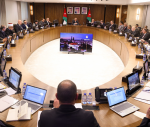You are here
Trump’s crazed transition
Jan 14,2017 - Last updated at Jan 14,2017
With Donald Trump’s inauguration as president of the United States fast approaching, the strangest — even craziest — post-election transition in US history is about to come to an end.
This period has provided a clear demonstration of how unpredictable life with President Trump will be.
A president-elect typically uses the transition time to make Cabinet choices and to study the issues he will soon confront, but keeps quiet on policy until he has been sworn into office.
But Trump has only paid lip service to the hallowed principle that the US has just one president at a time. Shortly after the election, he began to conduct his own foreign policy.
Just a couple of weeks after becoming president-elect, Trump took to Twitter to suggest that the British government name Nigel Farage, who had led the successful Brexit campaign, as the United Kingdom’s ambassador to the US.
Trump may have been unaware that governments choose their own ambassadors, and that the esteemed Sir Kim Darroch was already ensconced in the British embassy in Washington, DC. (The UK government quickly announced that Darroch would stay on.)
Soon thereafter, Trump took a congratulatory call from Taiwanese President Tsai Ing-wen — a sharp departure from the “one China” policy that presidents, Democratic and Republican alike, have upheld for more than 40 years.
China strongly condemned the move — and Trump’s subsequent tweets questioning America’s commitment to the one China policy.
Trump’s foreign-policy meddling reached its apex — at least so far — in late December, when he tried to interfere with President Barack Obama’s administration’s decision to abstain from voting on a United Nations Security Council resolution condemning Israel for continuing to build settlements in occupied Palestinian territories.
Traditionally, the US had vetoed such resolutions, though for some time now, administrations had taken the position that such settlements blocked progress on a two-state solution for the Israel-Palestine conflict.
Trump had already indicated that he wanted a closer relationship with the government of Israeli Prime Minister Benjamin Netanyahu, who backs the settlements. So he took it upon himself to call Egyptian President Abdel Fattah El Sisi and urged him to delay bringing up the resolution (it was postponed for only a day).
Trump also strongly criticised the Obama administration’s decision not to veto the resolution. And he named as his ambassador to Israel his antitrust lawyer, a man with no foreign-policy experience, who is a fervent backer of the settlements.
Yet perhaps the weirdest elements of the transition have been the manifestations of Trump’s apparent fondness for Russian President Vladimir Putin.
Trump says that he was simply trying a new approach, after years of cold, if not hostile, US-Russia relations. Perhaps.
Journalists have been trying to track down the origin of Trump’s softness towards Putin.
A small eruption occurred over news reports on January 10 that the intelligence agencies recently informed Trump and Obama of uncorroborated allegations that Russian intelligence agencies have compromising information on Trump’s business and personal behaviour.
While the validity of these claims remains very much in question, it is clear that the subject of Trump’s relationship with Putin is not going away anytime soon.
In any case, Trump’s attitude towards Putin has worrisome implications.
Does it mean that Trump will consent to Putin’s ambition to dominate Ukraine?
How would Trump — who questioned the value of NATO during the campaign — react if Putin committed aggression against one of the Baltic states, NATO allies towards which he has already made threatening gestures?
The fundamental question is: Is Putin playing Trump?
One manifestation of Trump’s predilection for giving Putin the benefit of the doubt was in his rejection of the finding of 17 US intelligence agencies, issued last October, that Russia was meddling in the presidential election.
After the election, the intelligence agencies described the actions Russia had taken: hacking into the e-mail accounts of the Democratic National Committee and of Hillary Clinton’s campaign chairman; arranging for embarrassing e-mails to be made public through Wikileaks; and purveying “fake news”.
Russia’s goal, the agencies declared, had been to damage Clinton’s campaign.
The implication that Russia may have helped him win was intolerable to Trump.
Angered by the prospect that anyone would consider his election invalid — which no serious person alleged — he ratcheted up his attacks on the CIA, the FBI and the Office of the Director of National Intelligence (which coordinates the findings of the various intelligence agencies).
Numerous members of Congress from both parties declared that it was unjust for Trump to malign the entire intelligence community — dedicated government workers, many of whom take on highly dangerous assignments.
Moreover, some commented, it was unwise: not only would Trump need to rely on these agencies in future crises; they are filled with skilled infighters who know how to use strategic leaks.
In time, Trump’s disdainful tweets about the intelligence agencies became a crisis for him.
When National Intelligence Director James Clapper testified in an open hearing of the Senate Armed Services Committee on December 6, including on the finding that Putin himself had directed the attempt to affect the US election, his testimony met with bipartisan approval.
Finally, Trump begrudgingly agreed to be briefed by intelligence agencies on Russia’s role in the election.
Urged by advisers to extricate himself from his lonely position on Russia’s meddling, Trump stated after the briefing that he has “tremendous respect” for the work of the intelligence agencies and acknowledged that Russia — but also other countries, he added, such as China — continually try to attack America’s cyber infrastructure.
In other words, there is nothing special about the election tampering.
Trump also insisted that “there was absolutely no effect on the outcome of the election”, even though the intelligence agencies had made no attempt to determine the actual impact of Russia’s unprecedented meddling in the 2016 presidential election.
Trump’s habit of tweeting at all hours on all manner of subjects has those in Washington, DC, including Republicans, on edge.
The most worrisome aspect of this strangest of transitions is what it foretells about what will happen when Trump gains the full power of the presidency.
The writer is a regular contributor to The New York Review of Books and the author, most recently, of “Washington Journal: Reporting Watergate and Richard Nixon’s Downfall”. ©Project Syndicate, 2017. www.project-syndicate.org












